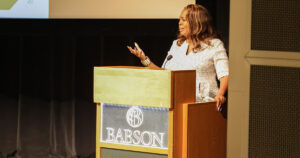Voting Rights Activist LaTosha Brown: ‘Can We Lead with Love?’
 It was 60 years ago this year that the Rev. Dr. Martin Luther King Jr. delivered his most famous speech, “I Have a Dream.”
It was 60 years ago this year that the Rev. Dr. Martin Luther King Jr. delivered his most famous speech, “I Have a Dream.”
Six decades may have passed since that milestone moment in August 1963, but there is much work to be done to make his dream of equality a reality. Many of the same problems and issues that he was confronting then still exist today, said voting rights activist LaTosha Brown, the keynote speaker at Babson College’s 20th annual Martin Luther King Jr. Legacy Day celebration Wednesday.
The substance of King’s mission and message, she said, was love. “Can we lead with love?” Brown asked. “That means we will create grace and space for ourselves and other people. It means that we would actually have a radical reimagination of what is possible in this country and in the world.”
Brown, cofounder of the Black Voters Matter Fund, is an award-winning visionary thought leader, institution builder, cultural activist, artist, and connector. She capped Babson’s MLK Legacy Day celebration with a rousing, challenging, and inspiring hourlong speech in front of more than 200 students, faculty, and staff at the Sorenson Center for the Arts.
The Challenge of Vision
Introduced by Black Student Union President Amoy Campbell ’23, Brown took the stage singing “This Little Light of Mine” on the first day of Black History Month. She then asked the audience to close their eyes and ponder what America would look like without racism. It’s a question she poses in every speech and a question, she said, that very few people have truly confronted.
“How in the world will we ever get to the point that we will have a nation free of racism when we cannot … even capture a vision of what it would look like?” she said. “What would a work day look like? What would institutions look like? What would medical and health care look like? We can’t even envision it, because it’s such a part of who we are, and it’s such a part of what we have accepted as truth.”
To truly celebrate King’s life and legacy, Brown said, “It’s going to require us to do some work, and it’s going to require us to do some visioning work. It is going to require us to ask ourselves that question every single day: What would America look like without racism?
“The good news is we can actually create that.”
Creating Change and Value
Creating that change starts by focusing on people, and valuing every individual life.
“I actually have the audacity to believe that I am a part of a larger movement to advance humanity and that every single human being deserves to be treated with dignity and respect,” Brown said. “If we value human life, how will you show up in the world? What kind of policies will you support? It’s going to require you having some courage to step outside of your comfort zone.”
Brown acknowledged that it should be uncomfortable. “Discomfort is good because what it does is it pushes us to the point that we have to sit in it and we have to think about it,” she said. “And, that’s where the opportunity for change happens.”
Putting people first by creating value, elevating the human condition, and leading change are cornerstones of entrepreneurial leadership, Babson President Stephen Spinelli Jr. MBA’92, PhD said in his opening remarks. And, Brown stands as a prime example.
“LaTosha’s journey is one we can all aspire to exemplify,” Spinelli said. “Just as we teach here at Babson, she has used her entrepreneurial leadership to create socio-economic change, bettering her local community, while also inspiring others across the country and beyond.”
Eric Beato, Editor of Babson Thought & Action and Babson Magazine